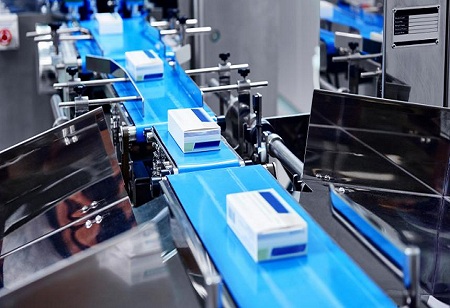As a result of technical advances, the
pharmaceutical business is undergoing significant change.
Smart packaging is one such game-changing invention. Smart packaging refers to the inclusion of intelligent features into traditional packaging methods to increase safety, traceability, and patient involvement.Effective packaging has transformed the
pharmaceutical industry by ensuring safe and consistent medication distribution. It has increased product protection and decreased counterfeiting, assuring the safety of people who use these items. Innovative packaging also provides for better medicine monitoring and tracing, making the entire process more efficient. Innovative packaging may also allow real-time monitoring of drugs, ensuring that they are maintained at the proper temperature and humidity conditions.This contributes to the medication's efficacy because fluctuations in temperature or humidity might impair the stability of the active components. Smart packaging can also include extra product information, such as usage directions, expiration dates, and warnings regarding potential negative effects. Some smart packaging solutions, for example, are meant to monitor daily doses and remind patients when to take their prescriptions, improving patient adherence.However, some contend that smart packaging is unnecessary and causes additional trash that is harmful to the environment. They claim that traditional
packaging methods are as effective and that smart packaging is really a marketing gimmick utilized by pharmaceutical corporations to sell more products. Smart packaging is a form of packaging in which technology is used to improve the operation of the container or the product itself. Let us look at the causes behind the rise of smart packaging in the pharmaceutical industry.
Enhanced Safety and Authentication
In an era where counterfeit pharmaceuticals constitute a serious threat to patient safety, smart packaging emerges as a game changer in maintaining pharmaceutical product authenticity and integrity. Smart packaging facilitates drug verification and authentication by adding modern technology such as near-field communication (NFC) chips, QR codes, or tamper-evident seals.These capabilities enable healthcare professionals, pharmacists, and even individuals to scan or verify items to ensure that they are real and from reputable sources. With smart packaging, real-time tracking and monitoring of medications along the supply chain become possible, reducing the possibility of counterfeit or inferior products accessing the market.Furthermore, smart packaging can convey useful information such as the expiration date, dose recommendations, and potential medication interactions. This allows patients to make more educated decisions while also empowering healthcare practitioners to provide more individualized treatment, eventually increasing drug adherence and patient outcomes.
IoT Integration and Real-Time Monitoring
The Internet of Things (IoT) has transformed several sectors, including the pharmaceutical industry. When smart packaging is
integrated with IoT technology, a linked ecosystem is created that enables for real-time monitoring and data collecting.Smart pill bottles with sensors, for example, may identify when a patient takes their medication and transfer this information to a smartphone app or a cloud-based platform. This information may be shared with healthcare experts, allowing them to monitor adherence patterns, identify potential noncompliance, and intervene as needed. Such proactive monitoring can be especially advantageous for people suffering from chronic conditions or enduring complicated treatment regimens.Furthermore, smart packaging enabled by IoT can monitor and maintain ideal storage conditions for temperature-sensitive pharmaceuticals. Temperature sensors included in the packaging can detect variations from the necessary range and send notifications to prevent rotting or efficacy loss.This functionality is especially important for vaccinations, insulin, and other temperature-sensitive drugs that must be kept at a constant temperature throughout the supply chain.Smart packaging not only assures the safety and efficacy of medications, but also allows for the gathering of useful data for research, quality control, and regulatory compliance.
Improved Patient Engagement and Adherence
Patient adherence to recommended drug regimens is one of the most serious difficulties in healthcare. Noncompliance with therapy can result in treatment failure, disease progression, increased healthcare expenses, and potentially negative health effects. Smart packaging includes a variety of elements that encourage patient participation and drug adherence.For starters, smart packaging may send patients individualized reminders and notifications when it is time to take their prescription. These reminders can be sent by smartphone applications, smart watches, or even interactive packaging interfaces. This subtle nudge encourages patients to stick to their prescription regimens, lowering the probability of missed doses.Second, smart packaging can help patients get instructional material. Patients may receive important medical information, such as side effects, drug interactions, and lifestyle suggestions, by scanning a QR code or tapping an NFC-enabled container. This interactive method encourages patients to take an active role in their treatment, resulting in improved comprehension and adherence.Smart packaging can also provide two-way communication between patients and healthcare practitioners. Patients can communicate directly with the package interface about their symptoms, side effects, or concerns, allowing remote monitoring and telehealth consultations. This seamless communication improves patient-provider interactions, ultimately leading to better healthcare results.Hence, smart packaging is changing the way drugs are packed, monitored, and consumed in the pharmaceutical industry. Smart packaging provides a variety of benefits that revolutionize the healthcare scene, ranging from increased safety and authentication to IoT connection and real-time monitoring, as well as greater patient involvement and adherence. We should expect even more novel features to be added into smart packaging as technology advances, resulting in improved efficiency, safety, and patient-centricity in the pharmaceutical business. To realize the full potential of smart packaging and assure a safer and more patient-centric future, pharmaceutical firm, healthcare providers, and regulators must embrace this transition.